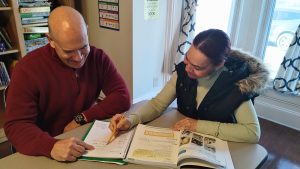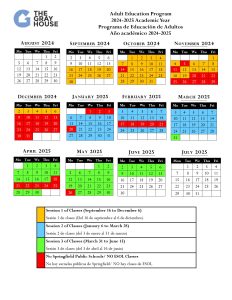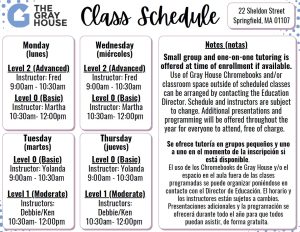Adult Education
Adult Education Program
Adult Education Program Mission and Philosophy
The Adult Education program helps low-income migrants residing in Springfield to improve their English language skills while incorporating life skills. The goal of the program is to help them gain self-sufficiency, better integrate into their community and give them the skills needed to break the cycle of poverty. To accomplish these goals, the Adult Education program uses a three-pronged approach which includes Literacy and Beginner ESOL classes, and the Community Connection Skills Series.
Using one-on-one and small group instruction which follow a set curriculum, The Gray House provides students with a safe, encouraging and supportive learning setting. Many of the students never received formal instruction in their native tongue, making the traditional classroom setting very intimidating. Not only are these students learning basic English language skills, but they are also learning how to learn and doing so in a supportive environment and community. Each class has a lead teacher assisted by trained volunteers. The ratio of teachers to students is typically 1:3. During the 2022-2023 Academic Year, 81 adult learners participated.
Students gain the educational skills needed to survive and succeed through this program which offers:
- Fundamental skills (reading, writing, math, finance, health and computer/digital) instruction
- Beginner ESOL (English for Speakers of Other Languages) classes
- Literacy development
- Drop-in intermediate level English conversation practice
For more information on the adult education program and student eligibility requirements, contact Education@grayhouse.org
Schedules and Levels
The Gray House offers three 12-week sessions throughout the academic year beginning in September and ending in June. All classes take place at The Gray House in the mornings and afternoons. Please see the academic calendar and weekly class schedule below.
Community Connection Skills Series
Each month, The Gray House Adult Education program will host presenters from several community agencies to acquaint the participants with the services they offer, answer questions and provide referrals for continued mentoring, coaching or assistance. The community skills scheduled for the upcoming academic year are:
- Financial Literacy
- Legal Aid
- Employment & Training
- Health Connections
- Housing
Volunteering
Volunteers are crucial to the success of this program. On average, 35 individuals volunteer 1.5 – 4 hours a week. Volunteers must complete required training before entering the classroom. If you are interested in volunteering, see our volunteer opportunities or contact our Education Director, Isabella at 413-734-6696 ext. 4.
FAQs
Who are your students?
Our students range from age 18 to 76 and all live at or below the poverty line. 100% are immigrants or refugees with poor English skills and who have not yet assimilated into American society. Despite many of them having lived in the U.S. for a number of years, they remain isolated in their own ethnic communities. Many of our students lack literacy in their native language, greatly magnifying the challenges of learning a foreign language. This lack of basic literacy skill, along with the trauma many of them have experienced, causes our students to typically learn English at a much slower rate. These students need much more individualized attention than other English Language Learners (ELLs).
Why is Adult Education needed?
A lack of education is a key indicator of poverty. The poverty rate has reached an overwhelming 46% in the 01107 zip code where The Gray House is located.
Of the adults age 25 and over, 53% have less than a high school education, 38% have a high school diploma or GED, and only 1% has a Bachelor’s degree or higher. This is a stark contrast to the respective State rates of 30%, 26% and 16%. These limited education levels result in alarming unemployment and income rates. Of the adults in tract 8006, 31% of are unemployed, 72% earn less than $25,000, and 68% live in poverty. Again this is in bleak contrast to the respective State levels of 7%, 7% and 20%.
In addition, 80% of the residents here speak a language other than English at home and 44% of those residents report that they speak no English at all or not well. Statistics show that education levels tend to decrease even more and unemployment rates increase for non-English speakers. Since education is key to career success and economic self-sufficiency, educational services are needed to help people learn, gain self-sufficiency and transition out of poverty.
Adult learners present a very diverse array of learning needs. Some people earned advanced degrees in their home countries and simply need to learn English. Others have never had access to education and cannot read or write in their native language, let alone in English. Some adults lack good experiences with school and are intimidated, overwhelmed or embarrassed. All need a safe, encouraging and supportive learning environment. They need individualized attention which addresses their personal learning styles, allows them to progress at their own pace, and helps them build confidence.
What do the Adult Education students learn?
Our adult learners gain the educational skills needed to survive and succeed. ESOL students develop communicative competence across the four skills of listening, speaking, reading and writing. There is emphasis for these students to learn survival skills for daily communication, for example, being able to ask what time it is, understanding basic money terms and common greetings. ESOL students benefit by acquiring skills that help them integrate into the community, such as learning to communicate with their child’s teacher or advocating for medical care. Our students also learn to recognize and understand cultural differences, such as eye contact, punctuality and interpersonal space.
In addition to acquiring educational skills, many students also improve their self-confidence and leadership skills. An essential component of our classes is digital literacy. No matter what the topic, our students frequently operate computers and look up information on the Internet during class time. By providing marginalized students with these resources, they are empowered to better navigate the systems that surround them, leading to improved quality of life for both the learners and their families.
How do you track student progress?
Via standardized assessment, students are initially tested during the intake process for placement into small group class levels. There is a post-testing at the end of each 12-week session to determine improvement and if they are eligible to move to the next level. Students who improve past the levels provided at The Gray House will receive assistance to enroll at another community program to continue their studies.



